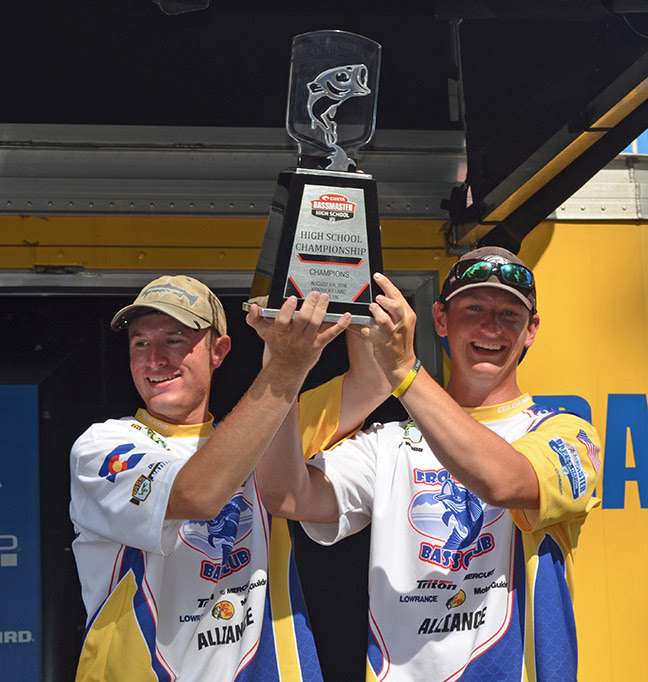
Editor’s note: Provided by St. Croix Rod
Park Falls, Wis. – We’ve all heard the adage “think outside the box.” And then there’s the axiom when anglers talk about their “confidence bait.” Combine the two and you know what you get? What it took for Ryan Wood and Turner Masson to win the 2016 Costa Bassmaster High School National Championship on Kentucky Lake, near Paris, Tennessee, in early August.
During a time of year when most anglers rely on catching bass in places where they should be — along cool, deep-water structure near old river beds in main-lake basins — Wood and Masson found big fish, and lots of them, where no one else was looking: In water no deeper than 3 feet, with the average bite occurring much shallower than that.
“Ryan and Turner are jerkbait junkies back home in Colorado,” says Chad LaChance, the winning duo’s coach during the three-day derby Aug. 4 through 6, as well a St. Croix pro and host of “Fishful Thinker.” “We decided early on they should use floating, shallow-diving jerkbaits well before prefishing started. And it was a decision that, obviously, paid off.”
Water temperatures were tickling the 93 degree mark and its clarity only about 8 inches; not the perfect scenario for catching lethargic bass in the heat of summer. Well, at least that’s everyone else thought.
Five-inch floating jerkbaits were the lure of choice, with white working best before the sun came up over the hillsides and chrome attracting the most strikes once the day wore on. And the baits were fished as fast as possible, with an irregular stop-and-go motion the key to getting the fish to strike the bait.
“Any lures that were more rhythmic during the retrieve, like square-billed or lip-less crankbaits, would be followed by fish, but never produced strikes,” LaChance adds. “It was the super-quick snap-and-pause motion while reeling quickly in that seemed to make the fish attack. And the calmer the water, the more action the boys had to give the lures. In fact, some of the fish shot through the water 30 feet to blast it.
“But you couldn’t just fish these baits with just any terminal tackle or rod; both had to be just right to get the lures to do what they needed to do.”
Wood and Masson were casting their jerkbaits on 15-pound-test Stren Braid Superline, with a 12-inch section of 20-pound-test monofilament attached via a uni-to-uni knot; then a Palomar knot connected the lure’s split ring at its nose. “It was more a rig you’d use in saltwater,” explains LaChance. “But that heavy, thick mono helped keep the lure higher in the water column, as well kept it from spinning in the air during the cast and entangling with the superline”.
“And the rod had to be just the right power and action to make the lure do what the boys needed them to do.”
With about 40 St. Croix rods onboard, Wood and Masson found both the 6-foot 8-inch medium-power extra-fast-action Legend Elite and Legend Xtreme to be the perfect sticks. “The rod could not have any sponginess to it,” LaChance states. Anything less than an extra-fast action and the jerkbait wouldn’t have its, well, ‘mechanical motion,’ you could say.”

The technique was deadly just about everywhere Wood and Masson fished, but all their fish during the derby came from only three, well-known spots on Kentucky Lake, about 22.5 miles from the takeoff sight. And it wasn’t just bass that were fooled by their baits; skip jack herring, pickerel, huge yellow perch and a muskie were also landed.
Wood and Masson, representing Front Range Bass Club of Legacy High School, were two of 340 anglers on behalf of 170 high schools from across the United States and Ontario, Canada. Their three-day total was 49 pounds 4 ounces, moving from 19th place on day one, to 4th place day two and then the win the following day.
According to Bassmaster, teams were awarded $70,250 in scholarship funds — B.A.S.S. contributed $21,000, while sponsors delivered $9,250 and Bethel University $40,000. Triton Boats honored each angler through sixth place with an additional $500 scholarship.





